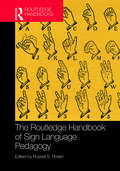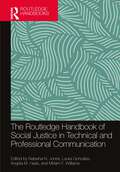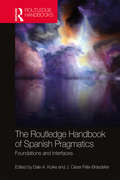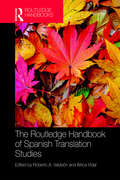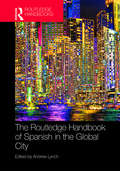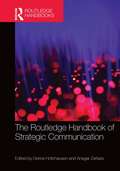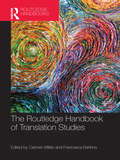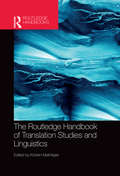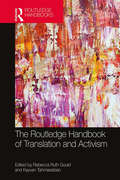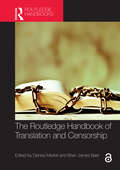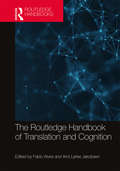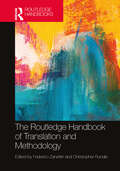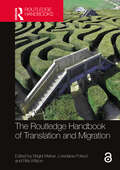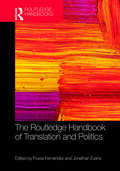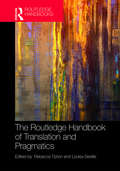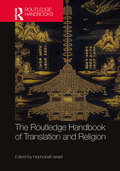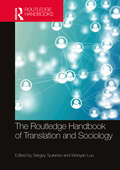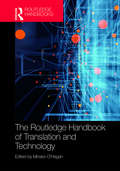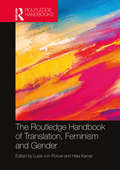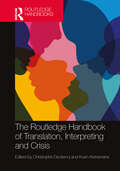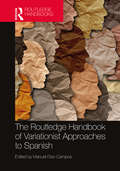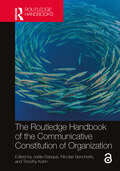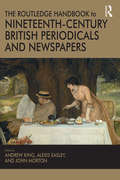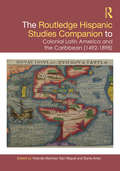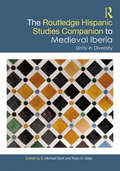- Table View
- List View
The Routledge Handbook of Sign Language Pedagogy (Routledge Language Handbooks)
by Russell S. RosenThe Routledge Handbook of Sign Language Pedagogy is the first reference of its kind, presenting contributions from leading experts in the field of sign language pedagogy. The Handbook fills a significant gap in the growing field of sign language pedagogy, compiling all essential aspects of current trends and empirical research in teaching, curricular design, and assessment in one volume. Each chapter includes historical perspectives, core issues, research approaches, key findings, pedagogical implications, future research direction, and additional references. The Routledge Handbook of Sign Language Pedagogy is an essential reference for sign language teachers, practitioners, and researchers in applied sign linguistics and first, second, and additional language learning.
The Routledge Handbook of Social Justice in Technical and Professional Communication (Routledge Handbooks in Communication Studies)
by Laura Gonzales Miriam F. Williams Natasha N. Jones Angela M. HaasThis handbook interrogates and illustrates contemporary approaches to technical and professional communication (TPC) by focusing on emerging issues in the field. Using a social justice-centered approach, the handbook provides a view of the current state of the discipline and highlights emerging directions and perspectives that will influence the trajectory of the field in the coming years. It is divided into five interrelated parts: Disciplinarity Pedagogy Practice Social Change Intersections: Cultures and Communities Acknowledging that TPC is always embedded and participating in specific power structures, The Routledge Handbook of Social Justice in Technical and Professional Communication offers readers a way forward, a future imagined and re-imagined, and presents scholarship that is progress-in-process for TPC. Providing frameworks and strategies for embracing a social justice-driven approach, this handbook will be of interest to scholars, teachers, administrators, community leaders, and workplace and industry practitioners in the field of TPC.
The Routledge Handbook of Spanish Pragmatics: Foundations and Interfaces (Routledge Spanish Language Handbooks)
by J. César Félix-Brasdefer Dale A. KoikeThe Routledge Handbook of Spanish Pragmatics is the first volume to offer a comprehensive overview of advances in Spanish Pragmatics, addressing different types of interaction and the variables, both social and linguistic, that can affect them. Written by a diverse set of experts in the field, the handbook unifies two major approaches to the study of pragmatics, the Anglo-American and European Continental traditions. Thirty-three chapters cover in detail both pragmatic foundations (e.g. speech act theory, implicature and relevance, deixis) and interfaces with other concepts, including: • Discourse • Variation; Culture and interculture • (Im)politeness; humor • Learning contexts and teaching • Technology This is an ideal reference for advanced undergraduate and postgraduate students, and researchers of Spanish language and linguistics.
The Routledge Handbook of Spanish Translation Studies (Routledge Spanish Language Handbooks)
by Roberto A. Valdeón África VidalWritten by leading experts in the area, The Routledge Handbook of Spanish Translation Studies brings together original contributions representing a culmination of the extensive research to-date within the field of Spanish Translation Studies. The Handbook covers a variety of translation related issues, both theoretical and practical, providing an overview of the field and establishing directions for future research. It starts by looking at the history of translation in Spain, the Americas during the colonial period and Latin America, and then moves on to discuss well-established areas of research such as literary translation and audiovisual translation, at which Spanish researchers have excelled. It also provides state-of-the-art information on new topics such as the interface between translation and humour on the one hand, and the translation of comics on the other. This Handbook is an indispensable resource for postgraduate students and researchers of translation studies.
The Routledge Handbook of Spanish in the Global City (Routledge Spanish Language Handbooks)
by Andrew LynchThe Routledge Handbook of Spanish in the Global City brings together contributions from an international team of scholars of language in society to offer a conceptual and empirical perspective on Spanish within the context of 15 major cosmopolitan cities from around the world. With a unique focus on Spanish as an international language, each chapter questions the traditional and modern notions of language, place, and identity in the urban context of globalization. This collection of new perspectives on the sociology of Spanish provides an insightful and invaluable resource for students and researchers seeking to explore lesser-known areas of sociolinguistic research.
The Routledge Handbook of Strategic Communication (Routledge Handbooks in Communication Studies)
by Ansgar Zerfass Derina HoltzhausenThe Routledge Handbook of Strategic Communication provides a comprehensive review of research in the strategic communication domain and offers educators and graduate-level students a compilation of approaches to and studies of varying aspects of the field. The volume provides insights into ongoing discussions that build an emerging body of knowledge. Focusing on the metatheoretical, philosophical, and applied aspects of strategic communication, the parts of the volume cover: • Conceptual foundations, • Institutional and organizational dimensions, • Implementing strategic communication, and • Domains of practice An international set of authors contributes to this volume, illustrating the broad arena in which this work is taking place. A timely volume surveying the current state of scholarship, this Handbook is essential reading for scholars in strategic communication at all levels of experience.
The Routledge Handbook of Translation Studies (Routledge Handbooks in Applied Linguistics)
by Carmen Millán Francesca BartrinaThe Routledge Handbook of Translation Studies provides a comprehensive, state-of-the-art account of the complex field of translation studies. Written by leading specialists from around the world, this volume brings together authoritative original articles on pressing issues including: the current status of the field and its interdisciplinary nature the problematic definition of the object of study the various theoretical frameworks the research methodologies available. The handbook also includes discussion of the most recent theoretical, descriptive and applied research, as well as glimpses of future directions within the field and an extensive up-to-date bibliography. The Routledge Handbook of Translation Studies is an indispensable resource for postgraduate students of translation studies.
The Routledge Handbook of Translation Studies and Linguistics (Routledge Handbooks in Translation and Interpreting Studies)
by Kirsten MalmkjærThe Routledge Handbook of Translation Studies and Linguistics explores the interrelationships between translation studies and linguistics in six sections of state-of-the-art chapters, written by leading specialists from around the world. The first part begins by addressing the relationships between translation studies and linguistics as major topics of study in themselves before focusing, in individual chapters, on the relationships between translation on the one hand and semantics, semiotics and the sound system of language on the other. Part II explores the nature of meaning and the ways in which meaning can be shared in text pairs that are related to each other as first-written texts and their translations, while Part III focuses on the relationships between translation and interpreting and the written and spoken word. Part IV considers the users of language and situations involving more than one language and Part V addresses technological tools that can assist language users. Finally, Part VI presents chapters on the links between areas of applied linguistics and translation and interpreting. With an introduction by the editor and an extensive bibliography, this handbook is an indispensable resource for advanced students of translation studies, interpreting studies and applied linguistics.
The Routledge Handbook of Translation and Activism (Routledge Handbooks in Translation and Interpreting Studies)
by Rebecca Ruth GouldThe Routledge Handbook of Translation and Activism provides an accessible, diverse and ground-breaking overview of literary, cultural, and political translation across a range of activist contexts. As the first extended collection to offer perspectives on translation and activism from a global perspective, this handbook includes case studies and histories of oppressed and marginalised people from over twenty different languages. The contributions will make visible the role of translation in promoting and enabling social change, in promoting equality, in fighting discrimination, in supporting human rights, and in challenging autocracy and injustice across the Middle East, Africa, Latin America, East Asia, the US and Europe. With a substantial introduction, thirty-one chapters, and an extensive bibliography, this Handbook is an indispensable resource for all activists, translators, students and researchers of translation and activism within translation and interpreting studies.
The Routledge Handbook of Translation and Censorship (Routledge Handbooks in Translation and Interpreting Studies)
by Brian James Baer Denise MerkleThe Routledge Handbook of Translation and Censorship is the first handbook to provide a comprehensive overview of the topic, offering broad geographic and historical coverage, and extending the political contexts to incorporate colonial and postcolonial viewpoints, as well as pluralistic societies. It examines key cultural texts of all kinds as well as audio-visual translation, comics, drama and videogames.With over 30 chapters, the Handbook highlights commonalities and differences across the various contexts, encouraging comparative approaches to the topic of translation and censorship. Edited and authored by leading figures in the field of Translation Studies, the chapters provide a critical mapping of the current research and suggest future directions.With an introductory chapter by the editors on theorizing censorship, the Handbook is an essential reference and resource for advanced students, scholars and researchers in translation studies, comparative literature and related fields.Chapter 30 of this book is freely available as a downloadable Open Access PDF at http://www.taylorfrancis.com under a Creative Commons Attribution-Non Commercial-No Derivatives (CC BY-NC-ND) 4.0 license.
The Routledge Handbook of Translation and Cognition (Routledge Handbooks in Translation and Interpreting Studies)
by Fabio AlvesThe Routledge Handbook of Translation and Cognition provides a comprehensive, state-of-the-art overview of how translation and cognition relate to each other, discussing the most important issues in the fledgling sub-discipline of Cognitive Translation Studies (CTS), from foundational to applied aspects. With a strong focus on interdisciplinarity, the handbook surveys concepts and methods in neighbouring disciplines that are concerned with cognition and how they relate to translational activity from a cognitive perspective. Looking at different types of cognitive processes, this volume also ventures into emergent areas such as neuroscience, artificial intelligence, cognitive ergonomics and human–computer interaction. With an editors’ introduction and 30 chapters authored by leading scholars in the field of Cognitive Translation Studies, this handbook is the essential reference and resource for students and researchers of translation and cognition and will also be of interest to those working in bilingualism, second-language acquisition and related areas.
The Routledge Handbook of Translation and Methodology (Routledge Handbooks in Translation and Interpreting Studies)
by Federico ZanettinThe Routledge Handbook of Translation and Methodology provides a comprehensive overview of methodologies in translation studies, including both well-established and more recent approaches. The Handbook is organised into three sections, the first of which covers methodological issues in the two main paradigms to have emerged from within translation studies, namely skopos theory and descriptive translation studies. The second section covers multidisciplinary perspectives in research methodology and considers their application in translation research. The third section deals with practical and pragmatic methodological issues. Each chapter provides a summary of relevant research, a literature overview, critical issues and topics, recommendations for best practice, and some suggestions for further reading. Bringing together over 30 eminent international scholars from a wide range of disciplinary and geographical backgrounds, this Handbook is essential reading for all students and scholars involved in translation methodology and research.
The Routledge Handbook of Translation and Migration (Routledge Handbooks in Translation and Interpreting Studies)
by Rita Wilson Brigid Maher Loredana PolezziThe Routledge Handbook of Translation and Migration explores the practices and attitudes surrounding migration and translation, aiming to redefine these two terms in light of their intersections and connections. The volume adopts an interdisciplinary and transnational perspective, highlighting the broad scope of migration and translation as not only linguistic and geographical phenomena, but also cultural, social, artistic, and psychological processes.The nexus between migration and translation, the central concern of this Handbook, challenges limited conceptualisations of identity and belonging, thereby also exposing the limitations of monolingual, monocultural models of nationhood. Through a diverse range of approaches and methodologies, individual chapters investigate specific historical circumstances and illustrate the need for an intersectional approach to questions of language access and language mediation.With its range of approaches and case studies, the volume highlights the inherently political nature of translation and its potential to shape social and cultural inclusion, emphasising the crucial role of language and translation in informing professional practices, institutional policies, educational approaches and community attitudes towards migration. By bringing together perspectives from both researchers and creative practitioners, this book makes an innovative contribution to ongoing global discussions on linguistic hospitality and diversity, ideal for those pursing postgraduate and doctoral studies in translation studies, linguistics, international studies and cultural studies.
The Routledge Handbook of Translation and Politics (Routledge Handbooks in Translation and Interpreting Studies)
by Jonathan Evans Fruela FernandezThe Routledge Handbook of Translation and Politics presents the first comprehensive, state of the art overview of the multiple ways in which ‘politics’ and ‘translation’ interact. Divided into four sections with thirty-three chapters written by a roster of international scholars, this handbook covers the translation of political ideas, the effects of political structures on translation and interpreting, the politics of translation and an array of case studies that range from the Classical Mediterranean to contemporary China. Considering established topics such as censorship, gender, translation under fascism, translators and interpreters at war, as well as emerging topics such as translation and development, the politics of localization, translation and interpreting in democratic movements, and the politics of translating popular music, the handbook offers a global and interdisciplinary introduction to the intersections between translation and interpreting studies and politics. With a substantial introduction and extensive bibliographies, this handbook is an indispensable resource for students and researchers of translation theory, politics and related areas.
The Routledge Handbook of Translation and Pragmatics (Routledge Handbooks in Translation and Interpreting Studies)
by Rebecca Tipton Louisa DesillaThe Routledge Handbook of Translation and Pragmatics provides an overview of key concepts and theory in pragmatics, charts developments in the disciplinary relationship between translation studies and pragmatics, and showcases applications of pragmatics-inspired research in a wide range of translation, spoken and signed language interpreting activities. Bringing together 22 authoritative chapters by leading scholars, this reference work is divided into three sections: Influences and Intersections, Methodological Issues, and Applications. Contributions focus on features of linguistic pragmatics and their analysis in authentic and experimental data relating to a wide range of translation and interpreting activities, including: news, scientific, literary and audiovisual translation, translation in online social media, healthcare interpreting and audio description for the theatre. It also encompasses contributions on issues beyond the level of the text that include the study of interpersonal relationships in practitioner networks and the development of pragmatic competence in interpreter training. Each chapter includes many practical illustrative examples and a list of recommended reading. Fundamental reading for students and academics in translation and interpreting studies, this is also an essential resource for those working in the related fields of linguistics, communication and intercultural studies.
The Routledge Handbook of Translation and Religion (Routledge Handbooks in Translation and Interpreting Studies)
by Hephzibah IsraelThe Routledge Handbook of Translation and Religion is the first to bring together an extensive interdisciplinary engagement with the multiple ways in which the concepts and practices of translation and religion intersect. The book engages a number of scholarly disciplines in conversation with each other, including the study of translation and interpreting, religion, philosophy, anthropology, history, art history, and area studies. A range of leading international specialists critically engage with changing understandings of the key categories ‘translation’ and ‘religion’ as discursive constructs, thus contributing to the development of a new field of academic study, translation and religion. The twenty-eight contributions, divided into six parts, analyze how translation constructs ideas, texts or objects as 'sacred' or for ‘religious purposes’, often in competition with what is categorized as ‘non-religious.’ The part played by faith communities is treated as integral to analyses of the role of translation in religion. It investigates how or why translation functions in re-constructing and transforming religion(s) and for whom and examines a range of ‘sacred texts’ in translation—from the written to the spoken, manuscript to print, paper to digital, architectural form to objects of sacred art, intersemiotic scriptural texts, and where commentary, exegesis and translation interweave. This Handbook is an indispensable scholarly resource for researchers in translation studies and the study of religions.
The Routledge Handbook of Translation and Sociology (Routledge Handbooks in Translation and Interpreting Studies)
by Sergey Tyulenev Wenyan LuoThe Routledge Handbook of Translation and Sociology is the first encyclopedic presentation of research into the social aspects of translation and interpreting. It consists of 35 chapters contributed by 40 experts in their respective fields of the sociology of translation. The Handbook traces the evolution of research into social aspects of translation and interpreting, explains the basics of the sociology of translation, offers an insight into studies of translation within sociology, and shows the place translation and interpreting occupies among social functional systems and its interactions with social forces and practices.With global coverage spanning all inhabited continents, the Handbook examines translational practices across diverse cultures and historical periods, from ancient origins to modern professional practices. Suitable for both undergraduate and postgraduate students of translation and interpreting, as well as researchers in the sociology of translation, the Handbook furnishes readers with a comprehensive understanding of the field. It offers a thorough exploration of the current state of the sociology of translation and suggests avenues for further research.
The Routledge Handbook of Translation and Technology (Routledge Handbooks in Translation and Interpreting Studies)
by Minako O'HaganThe Routledge Handbook of Translation and Technology provides a comprehensive and accessible overview of the dynamically evolving relationship between translation and technology. Divided into five parts, with an editor's introduction, this volume presents the perspectives of users of translation technologies, and of researchers concerned with issues arising from the increasing interdependency between translation and technology. The chapters in this Handbook tackle the advent of technologization at both a technical and a philosophical level, based on industry practice and academic research. Containing over 30 authoritative, cutting-edge chapters, this is an essential reference and resource for those studying and researching translation and technology. The volume will also be valuable for translators, computational linguists and developers of translation tools.
The Routledge Handbook of Translation, Feminism and Gender (Routledge Handbooks in Translation and Interpreting Studies)
by Luise Von Flotow Hala KamalThe Routledge Handbook of Translation, Feminism and Gender provides a comprehensive, state-of-the-art overview of feminism and gender awareness in translation and translation studies today. Bringing together work from more than 20 different countries – from Russia to Chile, Yemen, Turkey, China, India, Egypt and the Maghreb as well as the UK, Canada, the USA and Europe – this Handbook represents a transnational approach to this topic, which is in development in many parts of the world. With 41 chapters, this book presents, discusses, and critically examines many different aspects of gender in translation and its effects, both local and transnational. Providing overviews of key questions and case studies of work currently in progress, this Handbook is the essential reference and resource for students and researchers of translation, feminism, and gender.
The Routledge Handbook of Translation, Interpreting and Crisis (Routledge Handbooks in Translation and Interpreting Studies)
by Christophe Declercq Koen KerremansThis handbook offers a broad-ranging overview of the study of translating and interpreting in conflict and crisis settings and takes the field in new directions. Covering a wide selection of multimodal contexts that build on the fundamentals of translation, interpreting, and their in-between hybrid forms of mediation, the handbook is divided into four parts. The opening part covers perspectives on policy and practices, whether contemporary or historical, and cases truly span the globe, from Peru and Brazil, over Belgium and Sierra Leone, to Australia, Japan, and Hong Kong. International developments require profound considerations about the professionalisation of access to language in times of crises, not least in contexts of humanitarian negotiation or conflict zone interpreting–these form the second part. The subsequent part deals with spheres of community in which language needs are positioned within frames of agency, positionality, and trust, and the challenges that these face. The contributions build on cases where interpreters act as catalysts for translation needs in settings of humanitarian aid and beyond. The final part considers language strategies and solutions in crises. This handbook is the essential guide to translation and interpreting in conflict and crisis settings for advanced students and researchers of translation and interpreting studies and will be of wide interest in peace studies, political science, and beyond.
The Routledge Handbook of Variationist Approaches to Spanish (Routledge Spanish Language Handbooks)
by Manuel Díaz-CamposThe Routledge Handbook of Variationist Approaches to Spanish provides an up-to-date overview of the latest research examining sociolinguistic approaches to analyzing variation in Spanish. Divided into three sections, the book includes the most current research conducted in Spanish variationist sociolinguistics. This comprehensive volume covers phonological, morphosyntactic, social, and lexical variation in Spanish. Each section is further divided into subsections focusing on specific areas of language variation, highlighting the most salient and current developments in each subfield of Hispanic sociolinguistics. As such, this Handbook delves further into the details of topics relating to variation and change in Spanish than previous publications, with a focus on the symbolic sociolinguistic value of specific phenomena in the field. Encouraging readers to think critically about language variation, this book will be of interest to advanced undergraduate and graduate students, as well as researchers seeking to explore lesser-known areas of Hispanic sociolinguistics. The Routledge Handbook of Variationist Approaches to Spanish will be a welcome addition to specialists and students in the fields of linguistics, Hispanic linguistics, sociolinguistics, and linguistic anthropology.
The Routledge Handbook of the Communicative Constitution of Organization (Routledge Studies in Communication, Organization, and Organizing)
by Joëlle BasqueThis Handbook offers state of the art scholarship on the perspective known as the Communicative Constitution of Organization (CCO). Offering a unique outlook on how communication accounts for the emergence, change, and continuity of organizations and organizing practices, this Handbook systematically exposes the theoretical and methodological underpinnings of CCO, displays its empirical diversity, and articulates its future trajectory. Placing communication firmly at the centre of the organizational equation, an international team of expert authors covers: The key theoretical inspirations and the main themes of the field The debates that animate the CCO community CCO’s methodological approaches How CCO handles classic management themes Practical applications Offering a central statement of CCO’s contributions to the fields of organization studies, communication, and management, this Handbook will be of interest to organization studies and communication scholars, faculty, and graduate and advanced undergraduate students, as well as anyone associated with CCO theorizing seeking a comprehensive overview of the theoretical, methodological, and practical tenets of this growing area.
The Routledge Handbook to Nineteenth-Century British Periodicals and Newspapers
by John Morton Andrew King Alexis EasleyProviding a comprehensive, interdisciplinary examination of scholarship on nineteenth-century British periodicals, this volume surveys the current state of research and offers researchers an in-depth examination of contemporary methodologies. The impact of digital media and archives on the field informs all discussions of the print archive. Contributors illustrate their arguments with examples and contextualize their topics within broader areas of study, while also reflecting on how the study of periodicals may evolve in the future. The Handbook will serve as a valuable resource for scholars and students of nineteenth-century culture who are interested in issues of cultural formation, transformation, and transmission in a developing industrial and globalizing age, as well as those whose research focuses on the bibliographical and the micro case study. In addition to rendering a comprehensive review and critique of current research on nineteenth-century British periodicals, the Handbook suggests new avenues for research in the twenty-first century.
The Routledge Hispanic Studies Companion to Colonial Latin America and the Caribbean (Routledge Companions to Hispanic and Latin American Studies)
by Yolanda Martínez-San Miguel Santa AriasThe Routledge Hispanic Studies Companion to Colonial Latin America and the Caribbean (1492-1898) brings together an international team of scholars to explore new interdisciplinary and comparative approaches for the study of colonialism. Using four overarching themes, the volume examines a wide array of critical issues, key texts, and figures that demonstrate the significance of Colonial Latin America and the Caribbean across national and regional traditions and historical periods. This invaluable resource will be of interest to students and scholars of Spanish and Latin American studies examining colonial Caribbean and Latin America at the intersection of cultural and historical studies; transatlantic, postcolonial and decolonial studies; and critical approaches to archives and materiality. This timely volume assesses the impact and legacy of colonialism and coloniality.
The Routledge Hispanic Studies Companion to Medieval Iberia: Unity in Diversity (Routledge Companions to Hispanic and Latin American Studies)
by E. Michael Gerli and Ryan D. GilesThe Routledge Hispanic Studies Companion to Medieval Iberia: Unity in Diversity draws together the innovative work of renowned scholars as well as several thought-provoking essays from emergent academics, in order to provide broad-range, in-depth coverage of the major aspects of the Iberian medieval world. Exploring the social, political, cultural, religious, and economic history of the Iberian Peninsula, the volume includes 37 original essays grouped around fundamental themes such as Languages and Literatures, Spiritualities, and Visual Culture. This interdisciplinary volume is an excellent introduction and reference work for students and scholars in Iberian Studies and Medieval Studies. SERIES EDITOR: BRAD EPPS SPANISH LIST ADVISOR: JAVIER MUÑOZ-BASOLS
